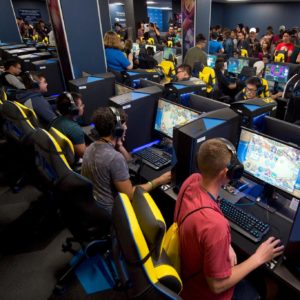Move over shoulder pads. Make room for mousepads.
We’ve come a long way since the Magnavox Odyssey and the Atari 2600, when video games were a friendly novelty showcasing crude pixelated graphics with colored squares. Today, geeks and gamers have gone pro. They aspire to be Tom Brady … in eSports.
For the out-of-shape, “eSports” (electronic sports) is a professional form of competition using video games. And it’s now big business.
Armed with contemporary panache, pro-gamers — known as “digital athletes” — compete in global tournaments for prize money that in 2017 exceeded $100 million. The top-ranked player last year was a 25-year-old named Kuro Takhasomi, who earned $2,436,772 playing for Germany’s Team Liquid. Some predict that global revenue will top $1.5 billion by 2020.
Remarkably, the first video game competition, “Spacewar,” occurred in 1972 at Stanford University.
With advances in hardware, software and connectivity, further spurred by Nintendo and Twitch, modern gaming has grown exponentially. Today, 65 percent of U.S. households have at least one person playing three or more hours of video games a week. The average gamer is 35 years old. A majority play MOBA (multiplayer online battle arena). And the most popular is called Counter-Strike: Global Offensive. (It renders the WOPR in the movie “War Games” a whimsical, digital antique.)
In 2014, sensing video gaming was both profitable and educational, Robert Morris University became the first to offer an eSport scholarship. Now, 50 schools recognize electronic gaming as a varsity sport. But it is not regulated by the NCAA, so student-athletes can still be paid.
The Wall Street Journal noted that “eSports are starting to look more and more like regular sports.” The new industry has embraced the subculture of conventional sports: corporate sponsors (the owners of the New England Patriots and Philadelphia 76ers have invested in teams) nutritionists and coaches. Players practice, watch video tape and are known for nicknames (“Goosebreeder,” “artStar”).
eSports are also a spectator sport. Two years ago, Madison Square Garden in New York (the “world’s most famous arena”) was sold out back-to-back nights hosting 16 teams for the semifinals of the League of Legends 2016 World Championships.
It’s too early to tell if eSports will go the way of Roller Derby or Jai Alai. But enthusiasts are already advocating it be an Olympic sport. That begs a question: Summer Games or Winter Games?

